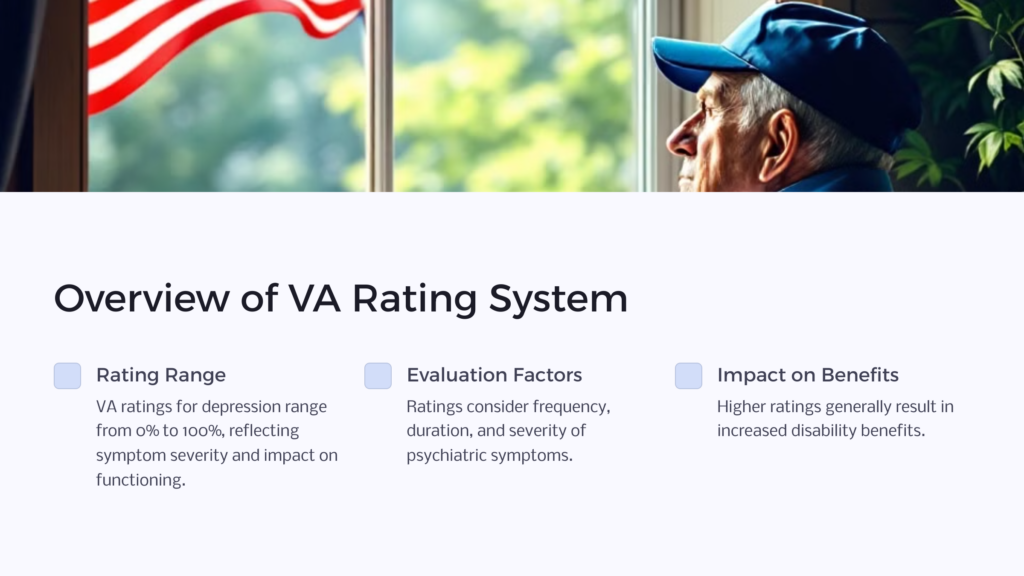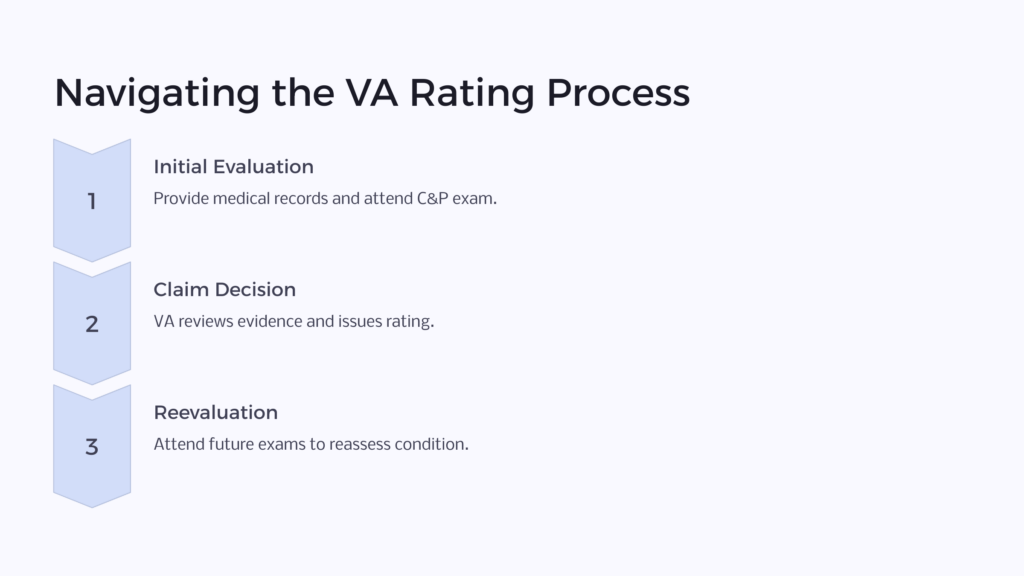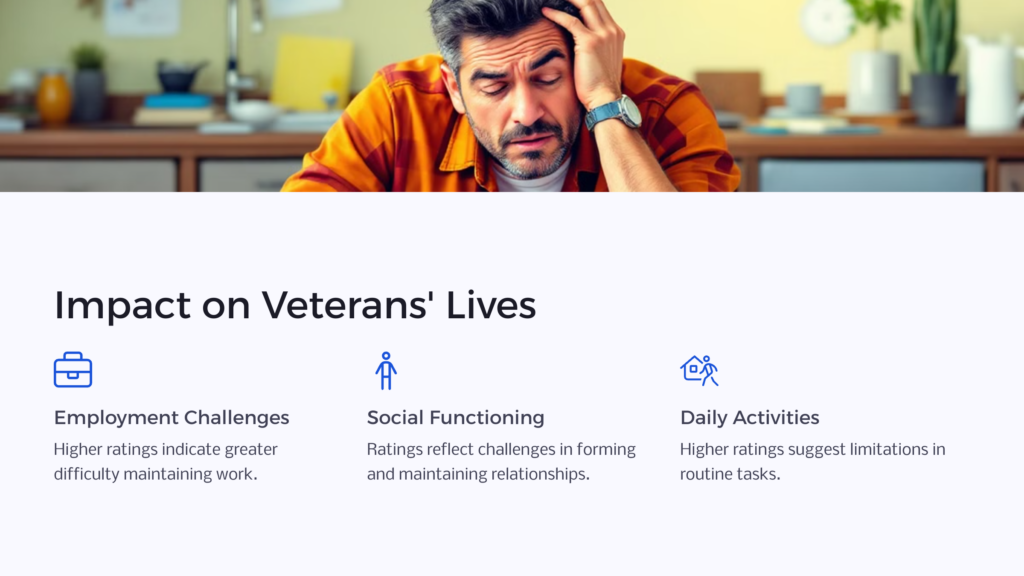When dealing with the complexities of depression after military service, understanding how the Department of Veterans Affairs (VA) approaches disability ratings is crucial. Your VA rating for depression reflects the degree to which your condition affects your work and daily life.
It’s more than just a measure of your health—it directly influences the benefits and compensation you’re eligible to receive. The VA considers various factors, including the severity of symptoms and their impact on occupational and social functioning.
If you’re pursuing a VA claim, it’s important to recognize that depression is acknowledged by the VA as a service-connected mental health issue. Symptoms might range from mild to severe and can manifest in different ways, influencing your ability to perform occupational tasks or engage in social activities.
The VA disability benefits rating system starts at 0% – meaning your depression is acknowledged by the VA but isn’t considered disabling – and can go as high as 100% for total occupational and social impairment due to your symptoms. Since depression is a common VA disability claim, it’s important to know if you qualify.
Overview of Depression VA Rating

The Veterans Affairs (VA) depression rating process evaluates how this mental health condition affects your daily life and work abilities, assigning a percentage that impacts your disability benefits for depression.
What is the VA Rating System?
The VA rating system for mental health is designed to assess the extent of a veteran’s service-connected disability. For mental disorders like depression, ratings vary from 0% to 100%. These VA rating percentages reflect the severity of symptoms and the degree to which depression impacts your occupational and social functioning. The system is nuanced and takes into account factors such as frequency, duration, and the severity of psychiatric symptoms.
Common VA Rating Myths & the Reality
VA Rating Myth #1: A diagnosis guarantees a high rating.
· Reality: Ratings are based on symptom severity and impact, not just a diagnosis.
VA Rating Myth #2: You can’t work if you receive a high rating.
· Reality: Even with ratings as high as 70% or higher, some veterans may still be able to work, depending on individual circumstances.
Understanding the Criteria for the Depression Rating Process

To obtain a VA rating for depression, you must meet certain criteria centered on service connection, provide medical evidence, and display symptoms that the VA assesses for severity and frequency. It’s important to understand the VA rating criteria for mental illness when trying to gain compensation.
Service Connection
Your depression must be linked to your military service to qualify for a VA disability rating. This means the onset or aggravation of your depression was due to your service. The VA requires a clear nexus between your depression and an in-service event, injury, or illness.
Medical Evidence Requirements
For the VA to evaluate your claim, you need to provide medical evidence of your depression. This includes a formal diagnosis from a healthcare provider, typically a psychiatrist or psychologist. Additionally, you must present medical records detailing your treatment history, including appointments and medications.
Severity and Frequency of Symptoms
The severity and frequency of your depressive symptoms heavily influence the VA rating scale for depression. For instance, mild symptoms that occasionally affect work might result in a lower rating, whereas symptoms that significantly impair your ability to work and socialize could lead to a higher rating. The VA rates depression under the same criteria as other mental disorders, considering factors such as:
· Mild (0-10% rating): If symptoms are managed successfully with continuous medication.
· Moderate (30-50% rating): If there is reduced reliability and productivity due to symptoms like depressed mood, anxiety, chronic sleep impairment, or disturbances of motivation and mood.
· Severe (70-100% rating): When there is a total occupational and social impairment evidenced by deficiencies in most areas such as work, school, family relations, judgment, thinking, or mood.
Rating Levels Defined
The VA rates depression based on the severity of depressive symptoms and their impact on occupational and social functioning. Your rating can range from 0% to 100%, reflecting the level of disability associated with your condition.
0% Noncompensable
At the 0% rating level, your depression is recognized by the VA but is deemed to not significantly impair your functioning or require continuous medication.
10% to 30% Disability
If you’re rated between 10% and 30%, this signifies that your depression produces occupational and social impairment due to mild or intermittent symptoms, such as mild depression, anxiety, panic attacks, or affective disturbances. An anxiety disability might be overlooked, but it can be rather serious.
50% to 70% Disability
A rating of 50% to 70% indicates more severe symptoms that result in deficiencies in most areas, like work, school, family relations, judgment, thinking, or mood. Symptoms might include more frequent episodes or a chronic depressed mood.
100% Disability
100% disability is given when your depression results in total occupational and social impairment due to symptoms such as persistent delusions or hallucinations, inappropriate behavior, or the inability to perform any occupational tasks.
Navigating the VA Rating Process for Mental Health Conditions

This section breaks down the process you will encounter when pursuing a VA disability rating for a mental health disorder, focusing on what is required at each step.
Initial Evaluation
When you begin, you will go through a mental health evaluation for veterans. You’ll need to provide all relevant medical records and possibly take part in a Compensation and Pension (C&P) exam. Documentation is critical, as it establishes the presence and severity of your condition. Ensure that you detail all symptoms and their impact on your daily life.
Claim Decision
After the evaluation, the VA will review your claim based on the evidence provided. Your medical records, C&P exam results, and any additional information will be considered to issue a rating. This rating is articulated as a percentage, reflecting the degree to which the condition affects your functionality and ability to work, and will help determine your VA disability compensation amount. For more insights into how depression is rated, visit Understanding Mental Health VA Disability Ratings.
Reevaluation Scheduling
The VA may schedule future examinations to reevaluate the status of your mental health condition. Keep in mind that conditions can change over time, which means so can your disability rating. It’s important to attend all reevaluations and continue to provide up-to-date medical information to ensure that your rating accurately reflects your current level of depression disability.
Impact on Veterans’ Lives

Veterans’ lives can be markedly affected by the severity of their depression, which their VA rating will indicate. This rating reflects your ability to work, engage socially, perform everyday tasks, and may necessitate ongoing medication.
Employment Challenges
Your VA rating for depression can reflect challenges in maintaining employment. A higher rating may indicate a debilitating impact on work performance and consistency. For instance, a 30% rating suggests that your ability to work may be hampered by your symptoms but not entirely precluded, while a higher 80% rating points towards a substantial difficulty that impairs your ability to work almost entirely.
Social Functioning
A VA rating measures how depression affects your social interactions. For example, a 50% rating suggests moderate difficulty in social situations, which may include challenges in forming and maintaining relationships. These difficulties are not just confined to personal relationships but can extend to interactions in workplace settings.
Routine Activities Limitations
Regarding daily living, a VA rating reflects the extent to which depression limits your routine activities. A high percentage points towards significant hindrances in performing daily tasks, which might include anything from self-care to household chores, potentially requiring assistance or frequent disruptions to manage these tasks effectively.
Need for Continuous Medication
The need for continuous medication is often a part of managing your service-connected depression. A higher VA rating is likely to correlate with a more intensive treatment regimen, which may include multiple medications to manage your symptoms. It’s important to understand that medication adherence might be essential to maintain a certain level of functioning and stability.
Appealing a Depression VA Rating Decision
If you believe that your VA rating for major depressive disorder does not accurately reflect your condition, you have the right to file an appeal. Sometimes, the VA rating accuracy isn’t correct and an appeal can help correct your situation. Understanding the appeals process and knowing your options for legal representation can provide a clearer path forward.
Filing an Appeal
To initiate an appeal, submit a Notice of Disagreement (NOD) with the VA. You must file your NOD within one year from the date on your decision letter. It’s important to include any new evidence that supports your claim and to specify whether you seek a review from a Decision Review Officer or the Board of Veterans’ Appeals.
The Process to Appeal VA Rating Decision
Once you’ve submitted your NOD for a VA decision, there are three main options for review:
· Supplemental Claim: You can submit new and relevant evidence that was not considered in the original decision.
· Higher-Level Review: A senior VA official will review your case without considering new evidence.
· Board Appeal: You can appeal directly to the Board of Veterans’ Appeals, opting for a hearing with a Veterans Law Judge.
It’s important to understand the VA rating reconsideration process so that there are no surprises.
Legal Representation
While you can appeal your rating decision independently, seeking the assistance of a VA-accredited attorney or Veterans Service Organization (VSO) can help. Experts in VA law can provide advice and represent your interests during the appeals process. Remember, representation can at times influence the outcome of your appeal by ensuring all critical supporting evidence is effectively presented.
Veteran Mental Health Resources for Depression
Navigating the challenging territory of depression requires understanding the support structures in place. You have access to a variety of services that provide veterans with mental health support, including counseling, support groups, and federal benefits.
VA Counselling Services
The Department of Veterans Affairs provides counseling services specifically designed for veterans with depression. You may take advantage of these veteran mental health resources regardless of your discharge status. The VA offers treatments such as psychotherapy, medication, and support to manage and alleviate symptoms.
Support Groups
Engaging with peers who share similar experiences can be highly beneficial. The VA facilitates access to support groups where you can connect with other veterans grappling with depression. These groups offer a space for sharing experiences, coping strategies, and mutual encouragement in a confidential setting.
Federal Benefits for Veterans
In recognition of the impact of service on mental health, the VA provides federal benefits for veterans with depression, including disability compensation. Eligibility for these benefits is predicated on the severity of your depression and its link to your service. Understanding your rating and the associated benefits is crucial for accessing the support you need.
Understanding the VA disability rating for depression is critical for receiving the appropriate level of benefits. Depression, or major depressive disorder, can severely impact various facets of your life, including work and relationships. The VA categorizes the severity of symptoms and assigns disability ratings from 0% to 100%.
If you need help figuring out if you qualify for VA benefits for depression, Trajector is here to assist you. Fill out our short mental health evaluation for veterans and we will be happy to help ensure you are receiving the maximum benefits available to you.
 Benefits.com Advisors
Benefits.com Advisors
With expertise spanning local, state, and federal benefit programs, our team is dedicated to guiding individuals towards the perfect program tailored to their unique circumstances.
Rise to the top with Peak Benefits!
Join our Peak Benefits Newsletter for the latest news, resources, and offers on all things government benefits.



















